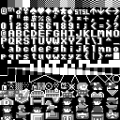Placeholder graphics
From NESdev Wiki
Jump to navigationJump to search
Most programmers can't produce large quantities of high-quality pixel art. So for a game that uses a scrolling map, it is wise to enlist artists. Ordinarily, it goes like this:
- Develop an engine
- Make a playable tech demo
- Attract artists
- Make the game itself, as a total conversion mod of the demo that you produced in step 2
But in order to make the demo, you'll need some art assets to put in your demo. Some people prefer to rip graphics from existing non-free NES games, but it could prove disastrous if enough of these tiles managed to make it into the final release. Art with clear provenance will avoid the sort of negative reception that one NES project's crowdfunding campaign got for using undisclosed placeholder art from other games.[1] It's better to use assets that require nothing more than crediting the author, like these:
References
- ↑ White Hat (@WhiteHat94). "What's with all the stolen sprites?". 2024-09-04. Accessed 2024-09-07.
External links
- By Chasersgaming on Itch: RPG Assets (NES); Tile Set Pack for NES (CC0 Public Domain)
- OpenGameArt (Various licenses)
- NES-like category
- Start with surt
- Some Bomber Planet backgrounds (PD)




